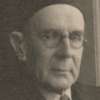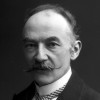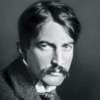Primitiveness and civilization are degrees of the same thing. If civilization has an opposite, it is war. Of these two things, you have either one, or the other. Not both.
Quotations about:
war
Note not all quotations have been tagged, so Search may find additional quotes on this topic.
The task of war is to destroy life; the task of peace is to create it; to organize labor so that it shall not incapacitate men for leisure; to establish justice as a foundation for personality; to unfold in men the capacity for noble joy and profound sorrow; to liberate them for the passion of love, the perception of beauty, the contemplation of truth. Of all these things war is the enemy.
G. Lowes Dickinson (1862-1932) British political scientist and philosopher [Goldsworthy "Goldie" Lowes Dickinson]
“The War and the Way Out: A Further Consideration,” sec. 3, Atlantic Monthly (1915-04)
(Source)
A war which is destroying men as they have never been destroyed before, from which at the best the nations will emerge permanently degraded in their stock, poorer in physique, duller in intelligence, weaker in will than they went in, this war is to be protracted until the whole manhood of Europe is decimated, in order — in order to what? Let us ask in detail.
In order, we are told, that the Germans may ‘feel they are beaten.’ And then? They will be good in future? They will admit they were wrong? They will lick the hand that chastised them? Who believes it? The more completely they are beaten, the more obstinately they will be set on recovery. When France was beaten to the dust in 1870, did she repent for having provoked the war? On the contrary, she gathered up her forces for revenge. And Germany will do the same.G. Lowes Dickinson (1862-1932) British political scientist and philosopher [Goldsworthy "Goldie" Lowes Dickinson]
“The War and the Way Out: A Further Consideration,” sec. 2, Atlantic Monthly (Apr 1915)
(Source)
In fact the state is primarily an organization for killing foreigners, that’s its main purpose. There are, of course, other things they do. They do a certain amount of educating, but, in the course of educating you, try very hard to make the young think it is a grand thing to kill foreigners.
Bertrand Russell (1872-1970) English mathematician and philosopher
Interview by Woodrow Wyatt, BBC TV (1959)
Collected in Bertrand Russell's BBC Interviews (1959) [UK] and Bertrand Russell Speaks His Mind (1960) [US].
Speaking of atheism, I remember one time when Jack Patton and I went to a sermon in Vietnam delivered by the highest-ranking Chaplain in the Army. He was a General.
The sermon was based on what he claimed was a well-known fact, that there were no Atheists in foxholes.
I asked Jack what he thought of the sermon afterwards, and he said, “There’s a Chaplain who never visited the front.”
No normal man who has smelled and associated with death ever wants to see any more of it. In fact, the only men who are even going to want to bloody noses in a fist fight after this war will be those who want people to think they were tough combat men, when they weren’t. The surest way to become a pacifist is to join the infantry.
What reason, what prudence, is there in wishing to glory in the greatness and extent of the empire, when you cannot point out the happiness of men who are always rolling, with dark fear and cruel lust, in warlike slaughters and in blood, which, whether shed in civil or foreign war, is still human blood; so that their joy may be compared to glass in its fragile splendor, of which one is horribly afraid lest it should be suddenly broken in pieces.
[Quae sit ratio, quae prudentia, cum hominum felicitatem non possis ostendere, semper in bellicis cladibus et in sanguine ciuili uel hostili, tamen humano cum tenebroso timore et cruenta cupiditate uersantium, ut uitrea laetitia comparetur fragiliter splendida, cui timeatur horribilius ne repente frangatur.]
Augustine of Hippo (354-430) Christian church father, philosopher, saint [b. Aurelius Augustinus]
City of God [De Civitate Dei], Book 4, ch. 3 (4.3) (AD 412-416) [tr. Dods (1871)]
(Source)
(Source (Latin)). Alternate translations:
You cannot show such estates to be anyway happy, as are in continual wars, and constantly in terror, trouble, and guilt of shedding human blood, though it be their foes’; with what reason or wisdom any man doth wish to glory in the largeness of empire, since all their joy is but as a glass, bright and brittle, and evermore in fear and danger of breaking.
[tr. Healey (1610)]
Is it reasonable and wise to glory in the extent and greatness of the Empire when you can in no way prove that there is any real happiness in men perpetually living amid the horrors of war, perpetually wading in blood? Does it matter whether it is the blood of their fellow citizens or the blood of their enemies? It is still human blood, in men perpetually haunted by the gloomy spectre of fear and driven by murderous passions. The happiness arising from such conditions is a thing of glass, of mere glittering brittleness. One can never shake off the horrible dread that it may suddenly shiver into fragments.
[tr. Zema/Walsh (1950)]
You cannot show that men are happy who live always amid the disasters of war. It matters not whether the blood shed is that of fellow-citizens or of enemies; in any case it is the blood of men. The dark shadow of fear and the lust for blood are always with them. Any joy that they know is like the glitter of brittle glass, which inspires the frightful thought that it may suddenly be shattered.
[tr. Green (Loeb) (1963)]
Is it reasonable, is it sensible, to boast of the extent and grandeur of empire, when you cannot show that men lived in happiness, as they passed their lives amid the horrors of war, amid the shedding of men's blood -- whether the blood of enemies or fellow-citizens -- under the shadow of fear and amid the terror of ruthless ambition? The only joy to be attained had the fragile brilliance of glass, a joy outweighed by the fear that it may be shattered in a moment.
[tr. Bettenson (1972)]
Is it wise or prudent to wish to glory in the breadth and magnitude of an empire when you cannot show that the men whose empire it is are happy? For the Romans always lived in dark fear and cruel lust, surrounded by the disasters of war and the shedding of blood which, whether that of fellow citizens or enemies, was human nonetheless. The joy of such men may be compared to the fragile splendour of glass: they are horribly afraid lest it be suddenly shattered.
[tr. Dyson (1998)]
What reason or sense is there in wanting to boast of the size and expanse of an empire when you cannot show that its people are happy? Or why boast of an empire if its people always dwell in the midst of the disasters of war and the spilling of blood -- the blood of fellow-citizens or the blood of foreign enemies, but, in either case, human blood -- and always live under the dark shadow of fear and in the lust for blood? Any joy they have may be compared to the fragile brilliance of glass: there is always the terrible fear that it will suddenly be shattered.
[tr. Babcock (2012)]
Yes; quaint and curious war is!
You shoot a fellow down
You’d treat if met where any bar is,
Or help to half-a-crown.
There ain’t nobody on earth, I don’t care how smart they are, ever going to make me believe they will ever stop wars.
I think the best insurance in the world against another war is to take care of the boys who fought in the last one. YOU MAY WANT TO USE THEM AGAIN.
Mark! where his carnage and his conquests cease!
He makes a solitude, and calls it — peace!George Gordon, Lord Byron (1788-1824) English poet
“The Bride of Abydos,” canto 2, st. 20 (1813)
(Source)
Adaptation from Tacitus' Agricola.
I renounce war. I renounce war because of what it does to our own men. I have watched them coming gassed from the front-line trenches. I have seen the long, long hospital trains filled with their mutilated bodies. I have heard the cries of the crazed and the prayers of those who wanted to die and could not, and I remember the maimed and ruined men for whom the war is not yet over. I renounce war because of what it compels us to do to our enemies, bombing their mothers in villages, starving their children by blockades, laughing over our coffee cups about every damnable thing we have been able to do to them. I renounce war for its consequences, for the lies it lives on and propagates, for the undying hatreds it arouses, for the dictatorships it puts in place of democracy, for the starvation that stalks after it. I renounce war, and never again, directly or indirectly, will I sanction or support another.
Harry Emerson Fosdick (1878-1969) American clergyman, author, teacher
“The Unknown Soldier,” Armistice Day sermon, Riverside Church, New York City (1933-11-12)
(Source)
Reprinted in The Secret of Victorious Living (1934).
Fosdick had been a vocal proponent of the US entering World War I, and served in France as a chaplain to the American troops. His experiences there led him to become a leading pacifist (but anti-isolationist) during the post-war years. He maintained that position into World War II and through the 1950s and 60s.
War is always the same. It is young men dying in the fullness of their promise. It is trying to kill a man that you do not know enough to hate. Therefore, to know war, is to know that there is still madness in the world.
Lyndon B. Johnson (1908-1973) American politician, educator, US President (1963-69)
State of the Union address (1966-01-12)
(Source)
There is no impersonal reason for regarding the interests of human beings as more important than those of animals. We can destroy animals more easily than they can destroy us; that is the only solid basis of our claim to superiority. We value art and science and literature, because these are things in which we excel. But whales might value spouting, and donkeys might maintain that a good bray is more exquisite than the music of Bach. We cannot prove them wrong except by the exercise of arbitrary power. All ethical systems, in the last analysis, depend upon weapons of war.
Bertrand Russell (1872-1970) English mathematician and philosopher
“If animals could talk,” New York American (1932-09-14)
(Source)
The aggressor is always peace-loving (as Bonaparte always claimed to be); he would prefer to take over our country unopposed. To prevent his doing so one must be willing to make war and be prepared for it. In other words it is the weak, those likely to need defense, who should always be armed in order not to be overwhelmed. Thus decrees the art of war.
[Der Eroberer ist immer friedliebend (wie Bonaparte auch stets behauptet hat), er zöge ganz gern ruhig in unseren Staat ein; damit er dies aber nicht könne, darum müssen wir den Krieg wollen und also auch vorbereiten, d. h. mit anderen Worten: es sollen gerade die Schwachen, der Verteidigung Unterworfenen, immer gerüstet sein und nicht überfallen werden; so will es die Kriegskunst.]
Karl von Clausewitz (1780-1831) Prussian soldier, historian, military theorist
On War [Vom Kriege], Book 6, ch. 5 “Character of Strategic Defense [Charakter der strategischen Verteidigung],” (6.5) (1832) [tr. Howard & Paret (1976)]
(Source)
(Source (German)). Alternate translation:
A conqueror is always a lover of peace (as Buonaparte always asserted of himself); he would like to make his entry into our state unopposed; in order to prevent this, we must choose war, and therefore also make preparations, that is in other words, it is just the weak, or that side which must defend itself, which should be always armed in order not to be taken by surprise; so it is willed by the art of war.
[tr. Graham (1873)]
Modern wars are seldom fought without hatred between nations; this serves as a more or less substitute for the hatred between individuals. Even when there is no natural hatred and no animosity to start with, the fighting itself will stir up hostile feelings: violence committed on superior orders will stir up the desire for revenge and retaliation against the perpetrator rather than against the powers that ordered the action. It is only human (or animal, if you like), but it is a fact.
[Der Nationalhaß, an dem es auch bei unseren Kriegen selten fehlt, vertritt bei dem einzelnen gegen den einzelnen mehr oder weniger stark die individuelle Feindschaft. Wo aber auch dieser fehlt und anfangs keine Erbitterung war, entzündet sich das feindselige Gefühl an dem Kampfe selbst, denn eine Gewaltsamkeit, die jemand auf höhere Weisung an uns verübt, wird uns zur Vergeltung und Rache gegen ihn entflammen, früher noch, ehe wir es gegen die höhere Gewalt sein werden, die ihm gebietet, so zu handeln. Dies ist menschlich oder auch tierisch, wenn man will, aber es ist so.]
Karl von Clausewitz (1780-1831) Prussian soldier, historian, military theorist
On War [Vom Kriege], Book 2, ch. 2 “On the Theory of War [Über die Theorie des Krieges],” § 17 (2.2.17) (1832) [tr. Howard & Paret (1976)]
(Source)
(Source (German)). Alternate translations:
National hatred, which is seldom wanting in our wars, is a substitute for personal hostility in the breast of individual opposed to individual. But where this also is wanting, and at first no animosity of feeling subsisted, a hostile feeling is kindled by the combat itself; for an act of violence which any one commits upon us by order of his superior, will excite in us a desire to retaliate and be revenged on him, sooner than on the superior power at whose command the act was done. This is human, or animal if we will; still it is so.
[tr. Graham (1873)]
National hatred, which is seldom lacking in our wars, becomes a more or less powerful substitute for personal hostility of individual against individual. But where this also is wanting, and, at first, no animosity existed, a hostile feeling is kindled by the combat itself. An act of violence which anyone commits upon us by order of his superior will excite in us the desire to retaliate and be revenged on him sooner than on the superior power at whose command the act was done. This is human -- animal, if you will -- but it is a fact.
[tr. Jolles (1943)]
When the judgment day comes, civilization will have an alibi: “I never took a human life, I only sold the fellow the gun to take it with.”
Kind-hearted people might of course think there was some ingenious way to disarm or defeat the enemy without too much bloodshed, and might imagine this is the true goal of the art of war. Pleasant as it sounds, it is a fallacy that must be exposed: War is such a dangerous business that mistakes that come from kindness are the very worst.
[Nun könnten menschenfreundliche Seelen sich leicht denken, es gebe ein künstliches Entwaffnen oder Niederwerfen des Gegners, ohne zuviel Wunden zu verursachen, und das sei die wahre Tendenz der Kriegskunst. Wie gut sich das auch ausnimmt, so muß man doch diesen Irrtum zerstören, denn in so gefährlichen Dingen, wie der Krieg eins ist, sind die Irrtümer, welche aus Gutmütigkeit entstehen, gerade die schlimmsten.]
Karl von Clausewitz (1780-1831) Prussian soldier, historian, military theorist
On War [Vom Kriege], Book 1, ch. 1 “What Is War? [Was ist der Krieg?],” § 3 (1.1.3) (1832) [tr. Howard & Paret (1976)]
(Source)
(Source (German)). Alternate translations:
Now, philanthropists may easily imagine there is a skilful method of disarming and overcoming an enemy without causing great bloodshed, and that this is the proper tendency of the art of War. However plausible this may appear, still it is an error which must be extirpated; for in such dangerous things as war, the errors which proceed from a spirit of benevolence are just the worst.
[tr. Graham (1873)]
Now philanthropic souls might easily imagine that there was an artistic way of disarming or overthrowing our adversary without too much bloodshed and that this was what the art of war should seek to achieve. However agreeable this may sound, it is a false idea which must be demolished. In affairs so dangerous as war, false ideas proceeding from kindness of heart are precisely the worst.
[tr. Jolles (1943)]
War is an act of violence, which in its application knows no bounds
[Der Krieg ist ein Akt der Gewalt, und es gibt in der Anwendung derselben keine Grenzen.]
Karl von Clausewitz (1780-1831) Prussian soldier, historian, military theorist
On War [Vom Kriege], Book 1, ch. 1 “What Is War? [Was ist der Krieg?],” § 3 (1.1.3) (1832) [tr. Graham (1873)]
(Source)
(Source (German)). Alternate translations:
War is an act of violence pushed to its utmost bounds.
[tr. Graham/Maude (1908)]
War is an act of force, and to the application of that force there is no limit.
[tr. Jolles (1943)]
War is an act of force, and there is no logical limit to the application of that force.
[tr. Howard & Paret (1976)]
War is nothing but a duel on a larger scale. Countess duels go to make up a war, but a picture of it as a whole can be formed by imagining a pair of wrestlers. Each tries through physical force to compel the other to do his will; his immediate aim is to throw his opponent in order to make him incapable of further resistance. War is thus an act of force to compel the enemy to do our will.
[Der Krieg ist nichts als ein erweiterter Zweikampf. Wollen wir uns die Unzahl der einzelnen Zweikämpfe, aus denen er besteht, als Einheit denken, so tun wir besser, uns zwei Ringende vorzustellen. Jeder sucht den anderen durch physische Gewalt zur Erfüllung seines Willens zu zwingen; sein nächster Zweck ist, den Gegner niederzuwerfen und dadurch zu jedem ferneren Widerstand unfähig zu machen. Der Krieg ist also ein Akt der Gewalt, um den Gegner zur Erfüllung unseres Willens zu zwingen.]
Karl von Clausewitz (1780-1831) Prussian soldier, historian, military theorist
On War [Vom Kriege], Book 1, ch. 1 “What Is War? [Was ist der Krieg?],” § 2 (1.1.2) (1832) [tr. Howard & Paret (1976)]
(Source)
(Source (German)). Alternate translations:
War is nothing but a duel on an extensive scale. If we would conceive as a unit the countless number of duels which make up a war, we shall do so best by supposing to ourselves two wrestlers. Each strives by physical force to compel the other to submit to his will: his first object is to throw his adversary, and thus to render him incapable of further resistance. War therefore is an act of violence to compel our opponent to fulfil our will.
[tr. Graham (1873)]
War is nothing but a duel on a larger scale. If we would combine into one conception the countless separate duels of which it consists, we would do well to think of two wrestlers. Each tries by physical force to compel the other to do his will; his immediate object is to overthrow his adversary and thereby make him incapable of any further resistance. War is thus an act of force to compel our adversary to do our will.
[tr. Jolles (1943)]
But you, Roman, remember, rule with all your power
the peoples of the earth — these will be your arts:
to put your stamp on the works and ways of peace,
to spare the defeated, break the proud in war.[Tu regere imperio populos, Romane, memento
(Hae tibi erunt artes), pacique imponere morem,
Parcere subjectis et debellare superbos.]Virgil (70-19 BC) Roman poet [b. Publius Vergilius Maro; also Vergil]
The Aeneid [Ænē̆is], Book 6, l. 851ff (6.851-53) [Anchises] (29-19 BC) [tr. Fagles (2006), l. 981ff]
(Source)
Comparing the Roman "arts" to the arts at which other nations excel (metalwork, sculpture, oratory, astronomy).
(Source (Latin)). Alternate translations:
Be thou ambitious how to govern best,
In these arts, Roman, thou must be profest.
That we a peace well grounded may injoy,
Subjects to spare, and Rebels to destroy.
[tr. Ogilby (1649)]
But, Rome, 'tis thine alone, with awful sway,
To rule mankind, and make the world obey,
Disposing peace and war by thy own majestic way;
To tame the proud, the fetter'd slave to free:
These are imperial arts, and worthy thee.
[tr. Dryden (1697)]
To rule the nations with imperial sway be thy care, O Romans: these shall be thy arts; to impose terms of peace, to spare the humbled, and crush the proud.
[tr. Davidson/Buckley (1854)]
But ye, my Romans, still control
The nations far and wide:
Be this your genius -- to impose
The rule of peace on vanquished foes,
Show pity to the humbled soul,
And crush the sons of pride
[tr. Conington (1866)]
But thou, O Roman, bend thy mind to rule
With strength thy people. This shall be thy art;
And to impose the terms and rules of peace;
To spare the vanquished, and subdue the proud.
[tr. Cranch (1872), l. 1069ff]
Be thy charge, O Roman, to rule the nations in thine empire; this shall be thine art, to lay down the law of peace, to be merciful to the conquered and beat the haughty down.
[tr. Mackail (1885)]
But thou, O Roman, look to it the folks of earth to sway;
For this shall be thine handicraft, peace on the world to lay,
To spare the weak, to wear the proud by constant weight of war.
[tr. Morris (1900), l. 850ff]
Thou, Roman, rule, and o'er the world proclaim
The ways of peace. Be these thy victories,
To spare the vanquished and the proud to tame.
These are imperial arts, and worthy of thy name.
[tr. Taylor (1907), st. 114, l. 1023ff.]
But thou, O Roman, learn with sovereign sway
To rule the nations. Thy great art shall be
To keep the world in lasting peace, to spare
humbled foe, and crush to earth the proud.
[tr. Williams (1910)]
Remember thou, O Roman, to rule the nations with thy sway -- these shall be thine arts -- to crown Peace with Law, to spare the humbled, and to tame in war the proud!
[tr. Fairclough (1916)]
Remember, Roman,
To rule the people under law, to establish
The way of peace, to battle down the haughty,
To spare the meek. Our fine arts, these, forever.
[tr. Humphries (1951)]
But, Romans, never forget that government is your medium!
Be this your art: -- to practise men in the habit of peace,
Generosity to the conquered, and firmness against aggressors.
[tr. Day-Lewis (1952)]
But yours will be the rulership of nations,
remember, Roman, these will be your arts:
to teach the ways of peace to those you conquer,
to spare defeated peoples, tame the proud.
[tr. Mandelbaum (1971), l. 1134ff]
Roman, remember by your strength to rule
Earth's peoples -- for your arts are to be these:
To pacify, to impose the rule of law,
To spare the conquered, battle down the proud.
[tr. Fitzgerald (1981), l. 1151ff]
Your task, Roman, and do not forget it, will be to govern the peoples of the world in your empire. These will be your arts -- and to impose a settle pattern upon peace, to pardon the defeated and war down the proud.
[tr. West (1990)]
Remember, Roman, it is for you to rule the nations with your power,
(that will be your skill) to crown peace with law,
to spare the conquered, and subdue the proud.
[tr. Kline (2002)]
Your mission, Roman, is to rule the world.
These will be your arts: to establish peace,
To spare the humbled, and to conquer the proud.
[tr. Lombardo (2005), l. 1012ff]
Roman, remember that your arts are to rule
The nations with your empire, to enforce the custom of peace,
To spare the conquered and to subjugate the proud.
[tr. @sentantiq (2018)]
You, Roman, remember your own arts: to rule the world with law, impose your ways on peace, grant the conquered clemency, and crush the proud in war.
[tr. Bartsch (2021)]
See also Bob Dylan, "Lonesome Day Blues", Love and Theft (2001):
I'm gonna spare the defeated --
I'm gonna speak to the crowd.
I'm gonna spare the defeated, boys,
I'm going to speak to the crowd.
I am goin' to teach peace to the conquered,
I'm gonna tame the proud.
FIRST SERVINGMAN: Let me have war, say I. It exceeds peace as far as day does night. It’s sprightly walking, audible, and full of vent. Peace is a very apoplexy, lethargy; mulled, deaf, sleepy, insensible; a getter of more bastard children than war’s a destroyer of men.
William Shakespeare (1564-1616) English dramatist and poet
Coriolanus, Act 4, sc. 5, l. 244ff (4.5.244-249) (c. 1608)
(Source)
All of our exalted technological progress, civilization for that matter, is comparable to an axe in the hand of a pathological criminal.
Albert Einstein (1879-1955) German-American physicist
Letter to Heinrich Zangger (6 Dec 1917), in Collected Papers, Vol. 8, # 403 (1987) [tr. Hentschel]
(Source)
The invention of gunpowder and the constant improvement of firearms are enough in themselves to show that the advance of civilization has done nothing practical to alter or deflect the impulse to destroy the enemy, which is central to the very idea of war.
[Die Erfindung des Pulvers, die immer weiter gehende Ausbildung des Feuergewehrs zeigen schon hinreichend, dase die in dem Begriff des Krieges liegende Tendenz zur Vernichtung des Gegners auch faktisch durch die zunehmende Bildung keineswegs gestört oder abgelenkt worden ist.]
Karl von Clausewitz (1780-1831) Prussian soldier, historian, military theorist
On War [Vom Kriege], Book 1, ch. 1 “What Is War? [Was ist der Krieg?],” § 3 (1.1.3) (1832) [tr. Howard & Paret (1976)]
(Source)
(Source (German)). Alternate translations:
The invention of gunpowder, the constant progress of improvements in the construction of firearms are sufficient proofs that the tendency to destroy the adversary which lies at the bottom of the conception of war, is in no way changed or modified through the progress of civilisation.
[tr. Graham (1873)]
The invention of gunpowder and the advances continually being made in the development of firearms, in themselves show clearly enough that the demand for the destruction of the enemy, inherent in the theoretical conception of war, has been in no way actually weakened or diverted by the advance of civilization
[tr. Jolles (1943)]
VOLUMNIA: Hear me profess sincerely: had I a dozen sons, each in my love alike and none less dear than thine and my good Martius, I had rather had eleven die nobly for their country than one voluptuously surfeit out of action.
William Shakespeare (1564-1616) English dramatist and poet
Coriolanus, Act 1, sc. 3, l. 21ff. (1.3.21) (c. 1608)
(Source)
"Voluptuously surfeit out of action" = to die indulgent, idle, and lazy
The art of war deals with living and with moral forces. Consequently, it cannot attain the absolute, or certainty; it must always leave a margin for uncertainty, in the greatest things as well as in the smallest. With uncertainty in one scale, courage and self-confidence should be thrown into the other to correct the balance. The greater they are, the greater the margin that can be left for accidents.
[Die Kriegskunst hat es mit lebendigen und mit moralischen Kräften zu thun; daraus folgt, dass sie nirgends das Absolute und Gewisse erreichen kann; es bleibt also überall dem Ungefähr ein Spielraum, und zwar eben so gross bei dem Grössten, wie bei dem Keinsten. Wie dieses Ungefähr auf dereinen Seite steht, muss Muth und Selbstvertrauen auf die andere treten und die Lücke ausfüllen. So gross, wie diese sind, so gross darf der Spielraum für jenes werden.]
Karl von Clausewitz (1780-1831) Prussian soldier, historian, military theorist
On War [Vom Kriege], Book 1, ch. 1 “What Is War? [Was ist der Krieg?],” § 22 (1.1.22) (1832) [tr. Howard & Paret (1976)]
(Source)
(Source (German)). Alternate translations:
The art of war has to deal with living and with moral forces; the consequence of which is that it can never attain the absolute and positive. There is therefore everywhere a margin for the accidental; and just as much inthe greatest things as in the smallest. As there is room for this accidental on the one hand, so on the other there must be courage and self-reliance in proportion to the room left. If these qualities are forthcoming in a high degree, the margin left may likewise be great.
[tr. Graham (1873)]
The art of war has to do with living and with moral forces; from this it follows that it can nowhere attain the absolute and certain; there remains always a margin for the accidental just as much with the greatest things as with the smallest. As on the one side stands this accidental element, so on the other courage and self-confidence must step forward and fill up the gap. The greater the courage and self-confidence, the larger the margin that may be left for the accidental.
[tr. Jolles (1943)]
Civilization, let me tell you what it is. First the soldier, then the merchant, then the priest, then the lawyer. The merchant hires the soldier and priest to conquer the country for him. First the soldier, he is a murderer; then the priest, he is a liar; then the merchant, he is a thief; and they all bring in the lawyer to make their laws and defend their deeds, and there you have your civilization!
Katherine Anne Porter (1890-1980) American journalist, essayist, author, political activist [b. Callie Russell Porter]
Ship of Fools, Part 2 [Hansen] (1962)
(Source)
Wars, horrendous wars,
and the Tiber foaming with tides of blood, I see it all![Bella, horrida bella,
Et Thybrim multo spumantem sanguine cerno.]Virgil (70-19 BC) Roman poet [b. Publius Vergilius Maro; also Vergil]
The Aeneid [Ænē̆is], Book 6, l. 86ff (6.86-87) [The Sybil] (29-19 BC) [tr. Fagles (2006)]
(Source)
(Source (Latin)). Alternate translations:
Wars, horrid wars I see,
And Tyber swell'd with blood.
[tr. Ogilby (1649)]
Wars, horrid wars, I view -- a field of blood,
And Tiber rolling with a purple flood.
[tr. Dryden (1697)]
Wars, horrid wars, I foresee, and Tiber foaming with a deluge of blood.
[tr. Davidson/Buckley (1854)]
War, dreadful war, and Tiber flood
I see incarnadined with blood.
[tr. Conington (1866)]
Dreadful war,
And Tiber frothed with blood, I see from far.
[tr. Cranch (1872), ll. 111-12]
Wars, grim wars I discern, and Tiber afoam with streams of blood.
[tr. Mackail (1885)]
Lo, war, war, dreadful war!
And Tiber bearing plenteous blood upon his foaming back.
[tr. Morris (1900)]
Woes in store,
Wars, savage wars, I see, and Tiber foam with gore.
[tr. Taylor (1907), st. 13, ll. 116-17]
War, red war!
And Tiber stained with bloody foam I see.
[tr. Williams (1910)]
Wars, grim wars I see, and Tiber foaming with streams of blood.
[tr. Fairclough (1916)]
War, I see,
Terrible war, and the river Tiber foaming
With streams of blood.
[tr. Humphries (1951)]
Wars, dreadful wars
I see, and Tiber foaming with torrents of human blood.
[tr. Day-Lewis (1952)]
I see wars, horrid wars, the Tiber foaming
with much blood.
[tr. Mandelbaum (1971), ll. 122-23]
Wars, vicious wars
I see ahead, and Tiber foaming blood.
[tr. Fitzgerald (1981), ll. 132-33]
I see wars, deadly wars, I see the Thybris foaming with torrents of blood.
[tr. West (1990)]
War, fierce war,
I see: and the Tiber foaming with much blood.
[tr. Kline (2002)]
War, I see horrible war, and the Tiber
Foaming with blood.
[tr. Lombardo (2005)]
I see brutal wars and bloody torrents frothing in the Tiber.
[tr. Bartsch (2021)]
From the happy expression on their faces you might have supposed that they welcomed the war. I have met with men who loved stamps, and stones, and snakes, but I could not imagine any man loving war.
Margot Asquith (1864-1945) British socialite, author, wit [Emma Margaret Asquith, Countess Oxford and Asquith; Margot Oxford; née Tennant]
Autobiography, Vol. 2, 3 Aug 1914 (1922)
(Source)
Of the cheering crowds outside 10 Downing Street on 3 Aug 1914, the night before the British Government (with her husband as Prime Minister) declared war against Germany.
And you, my Tyrians,
harry with hatred all his line, his race to come:
make that offering to my ashes, send it down below.
No love between our peoples, ever, no pacts of peace!
Come rising up from my bones, you avenger still unknown,
to stalk those Trojan settlers, hunt with fire and iron,
now or in time to come, whenever the power is yours.
Shore clash with shore, sea against sea, and sword
against sword — this is my curse — war between all
our peoples, all their children, endless war![Tum vos, o Tyrii, stirpem et genus omne futurum
exercete odiis, cinerique haec mittite nostro
munera. Nullus amor populis, nec foedera sunto.
Exoriare aliquis nostris ex ossibus ultor,
qui face Dardanios ferroque sequare colonos,
nunc, olim, quocumque dabunt se tempore vires.
Litora litoribus contraria, fluctibus undas
imprecor, arma armis; pugnent ipsique nepotesque.]Virgil (70-19 BC) Roman poet [b. Publius Vergilius Maro; also Vergil]
The Aeneid [Ænē̆is], Book 4, l. 622ff (4.622-629) [Dido] (29-19 BC) [tr. Fagles (2006), l. 775ff]
(Source)
Dido's deathbed curse, "foretelling" the Punic Wars between her Carthage and Aeneas' descendants in Rome.
(Source (Latin)). Alternate translations:
O Tyrians, strive this Nation to supplant
With restless wars this to my ashes grant:
Never joyn leagues, contract no amities,
And from our bones let some revenger rise,
Who Trojans may pursue with fire, and sword,
Ah, may when ever time shall strength afford,
Shores shores oppose, seas seas, our stocks debate
With arms gainst arms maintaine, I imprecate.
[tr. Ogilby (1649)]
And you, my Tyrians, ev'ry curse fulfil.
Perpetual hate and mortal wars proclaim,
Against the prince, the people, and the name.
These grateful off'rings on my grave bestow;
Nor league, nor love, the hostile nations know!
Now, and from hence, in ev'ry future age,
When rage excites your arms, and strength supplies the rage
Rise some avenger of our Libyan blood,
With fire and sword pursue the perjur'd brood;
Our arms, our seas, our shores, oppos'd to theirs;
And the same hate descend on all our heirs!
[tr. Dryden (1697)]
And, Tyrians, you through time to come
His seed with deathless hatred chase:
Be that your gift to Dido's tomb:
No love, no league 'twixt race and race.
Rise from my ashes, scourge of crime,
Born to pursue the Dardan horde
To-day, to-morrow, through all time,
Oft as our hands can wield the sword:
Fight shore with shore, fight sea with sea,
Fight all that are or e'er shall be!
[tr. Conington (1866)]
And ye, O Tyrians, follow with your hate
His seed, and all his future race! Be this
Your offering on my tomb! No love, no league
Between you ! Oh, may some avenger rise
From out my ashes, who with fire and sword
Shall chase these Dardan settlers, now, and in
The coming time, wherever strength is given;
Shores with shores fighting, waves with waves, and
arms With arms, -- they and their last posterity
[tr. Cranch (1872)]
And you, O Tyrians, hunt his seed with your hatred for all ages to come; send this guerdon to our ashes. Let no kindness nor truce be between the nations. Arise out of our dust, O unnamed avenger, to pursue the Dardanian settlement with firebrand and steel. Now, then, whensoever strength shall be given, I invoke the enmity of shore to shore, wave to water, sword to sword; let their battles go down to their children's children.
[tr. Mackail (1885)]
And ye, O Tyrians, 'gainst his race that is, and is to be,
Feed full your hate! When I am dead send down this gift to me:
No love betwixt the peoples twain, no troth for anything!
And thou, Avenger of my wrongs, from my dead bones outspring,
To bear the fire and the sword o'er Dardan-peopled earth
Now or hereafter; whensoe'er the day brings might to birth.
I pray the shore against the shore, the sea against the sea,
The sword 'gainst sword -- fight ye that are, and ye that are to be!
[tr. Morris (1900)]
Them and their children's children evermore
Ye Tyrians, with immortal hate outwear.
This gift -- 'twill please me best -- for Dido's shade prepare.
This heritage be yours; no truce nor trust
'Twixt theirs and ours, no union or accord
Arise, unknown Avenger from our dust;
With fire and steel upon the Dardan horde
Mete out the measure of their crimes' reward.
To-day, to-morrow, for eternity
Fight, oft as ye are able -- sword with sword,
Shore with opposing shore, and sea with sea;
Fight, Tyrians, all that are, and all that e'er shall be!
[tr. Taylor (1907)], st. 81-82, l. 720ff]
And -- O ye Tyrians! I
sting with your hatred all his seed and tribe
forevermore. This is the offering
my ashes ask. Betwixt our nations twain,
No love! No truce or amity! Arise,
Out of my dust, unknown Avenger, rise!
To harry and lay waste with sword and flame
those Dardan settlers, and to vex them sore,
to-day, to-morrow, and as long as power
is thine to use! My dying curse arrays
shore against shore and the opposing seas
in shock of arms with arms. May living foes
pass down from sire to son insatiate war
[tr. Williams (1910)]
Then do ye, O Tyrians, pursue with hate his whole stock and the race to come, and to my dust offer this tribute! Let no love nor league be between the nations. Arise from my ashes, unknown avenger! to chase with fire and sword the Dardan settlers, to-day, hereafter, whenever strength be given! May shore with shore clash, I pray, waters with waters, arms with arms; may they have war, they and their children's children!
[tr. Fairclough (1916)]
And you, O Tyrians, hate, and hate forever
The Trojan stock. Offer my dust this homage.
No love, no peace, between these nations, ever!
Rise from my bones, O great unknown avenger,
Hunt them with fire and sword, the Dardan settlers,
Now, then, here, there, wherever strength is given.
Shore against shore, wave against wave, and war,
War after war, for all the generations.
[tr. Humphries (1951)]
Let you, my Tyrians, sharpen your hatred upon his children
And all their seed for ever: send this as a present to
My ghost. Between my people and his, no love, no alliance!
Rise up from my dead bones, avenger! Rise up, one
To hound the Trojan settlers with fire and steel remorselessly,
Now, some day, whenever the strength for it shall be granted!
Shore to shore, sea to sea, weapon to weapon opposed --
I call down a feud between them and us to the last generation!
[tr. Day-Lewis (1952)]
Then, Tyrians, hunt down
with hatred all his sons and race to come;
send this as offering unto my ashes.
Do not let love or treaty tie our peoples.
May an avenger rise up from my bones,
one who will track with firebrand and sword
the Dardan settlers, now and in the future,
at any time that ways present themselves.
I call your shores to war against their shores,
your waves against their waves, arms with their arms.
Let them and their sons' sons learn what is war.
[tr. Mandelbaum (1971)]
Then, O my Tyrians, besiege with hate
His progeny and all his race to come:
Make this your offering to my dust. No love,
No pact must be between our peoples; No,
But rise up from my bones, avenging spirit!
Harry with fire and sword the Dardan countrymen
Now, or hereafter, at whatever time
The strength will be afforded. Coast with coast
In conflict, I implore, and sea with sea,
And arms with arms: may they contend in war,
Themselves and all the children of their children!
[tr. Fitzgerald (1981), l. 865ff]
As for you, my Tyrians, you must pursue with hatred the whole line of his descendants in time to come. Make that your offering to my shade. Let there be no love between our peoples and no treaties. Arise from my dead bones, O my unknown avenger, and harry the race of Dardanus with fire and sword wherever they may settle, now and in the future, whenever our strength allows it. I pray that we may stand opposed, shore against shore, sea against sea, and sword against sword. Let there be war between the nations and between their sons forever.
[tr. West (1990)]
Then, O Tyrians, pursue my hatred against his whole line
and the race to come, and offer it as a tribute to my ashes.
Let there be no love or treaties between our peoples.
Rise, some unknown avenger, from my dust, who will pursue
the Trojan colonists with fire and sword, now, or in time
to come, whenever the strength is granted him.
I pray that shore be opposed to shore, water to wave,
weapon to weapon: let them fight, them and their descendants.
[tr. Kline (2002)]
And you, my Tyrians, must persecute his line
Throughout the generations -- this your tribute
To Dido's ashes. May treaties never unite
These nations, may no love ever be lost between them
And from my bones may some avenger rise up
To harry the Trojans with fire and sword,
Now and whenever we have the power.
May coast oppose coast, waves batter waves,
Arms clash with arms, may they be ever at war,
They themselves and their children forever.
[tr. Lombardo (2005)]
Tyrians, you must torment his sons
and all his future race. Make this offering to my ashes.
Let there be no love or treaties between us.
Rise from my bones, unknown avenger,
hunt the Dardan colonists with flames and swords,
now or any times there's strength to strike!
My curse is this: our lands, our seas, our swords will clash.
The Trojans will fight wars for generations.
[tr. Bartsch (2021)]
He wishes that he, too, had a wound, a red badge of courage.
And the host laughed and wept, and in the midst of their merriment and tears the clear voice of the minstrel rose like silver and gold, and all men were hushed. And he sang to them, now in the Elven-tongue, now in the speech of the West, until their hearts, wounded with sweet words, overflowed, and their joy was like swords, and they passed in thought out to regions where pain and delight flow together and tears are the very wine of blessedness.
J.R.R. Tolkien (1892-1973) English writer, fabulist, philologist, academic [John Ronald Reuel Tolkien]
The Lord of the Rings, Vol. 3: The Return of the King, Book 6, ch. 4 “The Field of Cormallen” (1955)
(Source)
Surprise becomes effective when we suddenly face the enemy at one point with far more troops than he expected. This type of numerical superiority is quite distinct from numerical superiority in general: it is the most powerful medium in the art of war.
[Die Überraschung zeigt sich dadurch wirksam, dass man dem Feinde auf einem Punkt viel mehr Truppen entgegen stellt, als er erwartete. Diese Überlegenheit der Zahl ist von der allgemeinen sehr verschieden, sie ist das wichtigste Agens der Kriegskunst.]
Karl von Clausewitz (1780-1831) Prussian soldier, historian, military theorist
On War [Vom Kriege], Book 6, ch. 2 “The Relations of the Offensive and Defensive to Each Other in Tactics [Wie verhalten sich Angriff und Verteidigung in der Taktik zueinander]” (6.2) (1832) [tr. Howard & Paret (1976)]
(Source)
(Source(German)). Alternate translations:
The surprise produces an effect by opposing to the enemy a great many more troops than he expected at some particular point. The superiority in numbers in this case is very different to a general superiority of numbers; it is the most powerful agent in the art of war.
[tr. Graham (1873)]
The suprise produces an effect by opposing to the enemy at some particular point a great many more troops than he expected. The superiority in numbres in this case is very different from the general superiority of numbers; it is the most powerful agent in the art of war.
[tr. Jolles (1943)]
War should be made with no other view than the attainment of peace.
[Bellum autem ita suscipiatur, ut nihil aliud nisi pax quaesita videatur.]
Marcus Tullius Cicero (106-43 BC) Roman orator, statesman, philosopher
De Officiis [On Duties; On Moral Duty; The Offices], Book 1, ch. 23 (1.23) / sec. 80 (44 BC) [tr. McCartney (1798)]
(Source)
(Source (Latin)). Alternate translations:
And as for war, it should never be undertaken with any other aim, but only that of obtaining an honourable peace.
[tr. Cockman (1699)]
Now in engaging in war we ought to make it appear that we have no other view but peace.
[tr. Edmonds (1865)]
But war should be undertaken in such a way that it may seem nothing else than a quest of peace.
[tr. Peabody (1883)]
We should only take up arms when it is evident that peace is the one object we pursue.
[tr. Gardiner (1899)]
We should so enter upon war as to show that our only desire is peace.
[ed. Harbottle (1906)]
War, however, should be undertaken in such a way as to make it evident that it has no other object than to secure peace.
[tr. Miller (1913)]
You should start a war, moreover, in such a way that you clearly have no other object than peace.
[tr. Edinger (1974)]
Fighting is like champagne. It goes to the heads of cowards as quickly as of heroes. Any fool can be brave on a battlefield when it’s be brave or else be killed.
Margaret Mitchell (1900-1949) American author and journalist.
Gone with the Wind, ch. 31 [Ashley] (1936)
(Source)
So when, in future times, men ask you to prove patriotism and loyalty and affection for your native land — remember that these things are not always equated with a willingness to die or to kill.
Rod Serling (1924-1975) American screenwriter, playwright, television producer, narrator
Commencement Address, Ithaca College, New York (13 May 1972)
(Source)
Remember that you can’t necessarily sanctify a cause by virtue of the fact that men die for it. A death in a worthless or even questionable cause is a pointless, meaningless, tragically premature death.
Rod Serling (1924-1975) American screenwriter, playwright, television producer, narrator
Commencement Address, Ithaca College, New York (13 May 1972)
(Source)
American society has always exercised a stronger pressure on individual behavior than Western European societies; but in time of war this pressure is notched a few degrees, and starts to become quite alarming.
Tzvetan Todorov (1939-2017) Bulgarian-French historian, philosopher, literary critic, sociologist
The New World Disorder: Reflections of a European, ch. 3 (2005)
(Source)
There are things in the breast of mankind which are best
In darkness and secrecy hid;
For you never can tell, when you’ve opened a hell,
How soon you can put back the lid.Rudyard Kipling (1865-1936) English writer
“The Sons of the Suburbs” (1916)
(Source)
On bloodthirstiness in war by previously peaceful people.
Originally written for the Christmas 1916 issue of Blighty, a magazine for servicemen. It was rejected, eventually to be published in the Sunday Pictorial (19 Jan 1936). It was never included by Kipling in any of his collections.
Smiting enemies has always been so admired that, unlike medicine or archaeology, it entitled its successful practitioners to become kings, emperors, and presidents of the United States like Washington, Jackson, William Henry Harrison, Taylor, Grant, and Eisenhower.
If a quick glance back over world history shows us anything, it shows us that war was one of our most universal joys from our earliest beginnings, savored at every possible opportunity and even some quite incomprehensible ones, like the assassination of Archduke Ferdinand, whomever he may have been.
Barbara Holland (1933-2010) American author
“War,” Wasn’t the Grass Greener? (1999)
(Source)
First appeared in Smithsonian (Jun 1992).
Too many wars are fought almost as if by rote. Too many wars are fought out of sloganry, out of battle hymns, out of aged, musty appeals to patriotism that went out with knighthood and moats. Love your country because it is eminently worthy of your affection. Respect it because it deserves your respect. Be loyal to it because it cannot survive without your loyalty. But do not accept the shedding of blood as a natural function or a prescribed way of history, even if history points this up by its repetition. That men die for causes does not necessarily sanctify that cause. And that men are maimed and torn to pieces every fifteen and twenty years does not immortalize or deify the act of war.
Rod Serling (1924-1975) American screenwriter, playwright, television producer, narrator
Commencement Address, Binghamton Central High School, Binghamton, New York (28 Jan 1968)
(Source)
Everywhere, wrenching grief, everywhere, terror
and a thousand shapes of death.[Crudelis ubique
Luctus, ubique pavor, et plurima mortis imago.]Virgil (70-19 BC) Roman poet [b. Publius Vergilius Maro; also Vergil]
The Aeneid [Ænē̆is], Book 2, l. 368ff (2.368-369) (29-19 BC) [tr. Fagles (2006), ll. 461-462]
(Source)
On the fighting in the streets of Troy. (Source (Latin)). Alternate translations:
In all parts cruell grief, in all parts feare,
And various shapes of death was every where.
[tr. Ogilby (1649)]
All parts resound with tumults, plaints, and fears;
And grisly Death in sundry shapes appears.
[tr. Dryden (1697)]
Every where is cruel sorrow, every where terror and death in thousand shapes.
[tr. Davidson/Buckley (1854)]
Dire agonies, wild terrors swarm,
And Death glares grim in many a form.
[tr. Conington (1866)]
And everywhere are sounds of bitter grief,
And terror everywhere, and shapes of death.
[tr. Cranch (1872), l. 506-507]
Everywhere is cruel agony, everywhere terror, and the sight of death at every turn.
[tr. Mackail (1885)]
Grim grief on every side,
And fear on every side there is, and many-faced is death.
[tr. Morris (1900)]
All around
Wailings, and wild affright and shapes of death abound.
[tr. Taylor (1907), st. 49, l. 440-41]
Anguish and woe
were everywhere; pale terrors ranged abroad,
and multitudinous death met every eye.
[tr. Williams (1910)]
Everywhere sorrow,
Everywhere panic, everywhere the image
Of death, made manifold.
[tr. Humphries (1951)]
All over the town you saw
Heart-rending agony, panic, and every shape of death.
[tr. Day Lewis (1952)]
And everywhere
are fear, harsh grief, and many shapes of slaughter.
[tr. Mandelbaum (1971), l. 497-98]
Grief everywhere,
Everywhere terror, and all shapes of death.
[tr. Fitzgerald (1981)]
Bitter grief was everywhere. Everywhere there was fear, and death in many forms.
[tr. West (1990)]
Cruel mourning is everywhere,
everywhere there is panic, and many a form of death.
[tr. Kline (2002)]
Raw fear
Was everywhere, grief was everywhere,
Everywhere the many masks of death.
[tr. Lombardo (2005)]
All around were bitter grief and fear, and different scenes of death.
[tr. Bartsch (2021)]
Happiness is thought to imply leisure; for we toil in order that we may have leisure, as we make war in order that we may enjoy peace.
[δοκεῖ τε ἡ εὐδαιμονία ἐν τῇ σχολῇ εἶναι, ἀσχολούμεθα γὰρ ἵνα σχολάζωμεν καὶ πολεμοῦμεν ἵν᾽ εἰρήνην ἄγωμεν.]
Aristotle (384-322 BC) Greek philosopher
Nicomachean Ethics [Ἠθικὰ Νικομάχεια], Book 10, ch. 7 (10.7) / 1177b.4 (c. 325 BC) [tr. Peters (1893), 10.7.6]
(Source)
(Source (Greek)). Alternate translations:
Happiness is thought to stand in perfect rest; for we toil that we may rest, and war that we may be at peace.
[tr. Chase (1847), ch. 6]
It would seem that happiness is the very antithesis of a busy life, in that it is compatible with perfect leisures. And it is with such leisure in view that a busy life is always led, exactly as war is only waged for the sake of ultimate peace.
[tr. Williams (1869)]
The end of labor is to gain leisure.
[in Ballou, Treasury of Thought (1872)]
Happiness is thought to depend on leisure; for we are busy that we may have leisure, and make war that we may live in peace.
[tr. Ross (1908)]
Happiness is thought to involve leisure; for we do business in order that we may have leisure, and carry on war in order that we may have peace.
[tr. Rackham (1934)]
Happiness seems to reside in leisure, since we do unleisured things in order to be at leisure, and wage war in order to live in peace.
[tr. Reeve (1948)]
Happiness is thought to depend on leisure; for we toil for the sake of leisurely activity, and we are at war for the sake of peaceful activity.
[tr. Apostle (1975)]
Happiness seems to depend on leisure, because we work to have leisure, and wage war to live in peace.
[tr. Crisp (2000)]
[Because], happiness seems to reside in leisure, we labor [sacrifice leisure] so that we may have leisure.
[tr. @sentantiq (2018)]
Dear Ald,
Been an odd day … It’s all quite incredible — not that twenty years have gone by nor even that I survived … it is just to walk over the same ground after so much has happened and to remember it all with such infinite clarity.
Last week, I went back to a little village outside of Manila called Paranaque. My last visit there was February 4, 1945, and I spent one day and one night getting shelled. So I took the nostalgic walk one early morning and drank it all in and began to feel sad because nobody came up to me as they did twenty years ago and grin and say, “Victory, Joe!” So three hours later I went through a tiny alley and wound up on a dirty beach overlooking the ocean, and this little grimy 8-year-old kid comes up to me and says, “What are you looking for, Joe?” And I cup this dirty little brown face in my hand and I answer, “My youth, Joe.”
Hey, Ald! You can’t go back. At least you can’t go back and experience. You return as a tourist just to observe. Like visiting a cemetery. Nobody’s around to talk to you and reminisce, even though deep in your gut you have this urge to tap some ghost on a shoulder and say, “Hey, buddy, remember that afternoon ….”
Shrapnel wounds and mangled, bullet ridden bodies are not the only casualties of war. There are casualties of the mind. Every war produces a backwash, a residue of pain and grief.
Rod Serling (1924-1975) American screenwriter, playwright, television producer, narrator
Comment, Antioch College (c. 1965)
(Source)
As quoted in Anne Serling, As I Knew Him: My Dad, Rod Serling (2013).
One does not export democracy in an armored vehicle.
[On n’exporte pas la démocratie dans un fourgon blindé.]
It seems war stories aren’t very well received at this point. I’m told they’re outdated, untimely and as might be expected — make some unpleasant reading. And, as you have no doubt already perceived, human beings don’t like to remember unpleasant things. They gird themselves with the armor of wishful thinking, protect themselves with a shield of impenetrable optimism, and, with a few exceptions, seem to accomplish their “forgetting” quite admirably. But you, my children, I don’t want you to be among those who choose to forget. I want you to read my stories and a lot of others like them. I want you to fill your heads with Remarque and Tolstoy and Ernie Pyle. I want you to know what shrapnel, and “88’s” and mortar shells and mustard gas mean. I want you to feel, no matter how vicariously, a semblance of the feeling of a torn limb, a burnt patch of flesh, the crippling, numbing sensation of fear, the hopeless emptiness of fatigue. All these things are complementary to the province of War and they should be taught and demonstrated in classrooms along with the more heroic aspects of uniforms, and flags, and honor and patriotism.
Rod Serling (1924-1975) American screenwriter, playwright, television producer, narrator
“First Squad, First Platoon,” Dedication (c. 1947)
(Source)
Dedication to his unborn children, in one of his first (unpublished) works of fiction, while at Antioch College under the GI Bill. In Anne Serling, As I Knew Him: My Dad, Rod Serling (2013)
At the moment, for example, in 1984 (if it was 1984), Oceania was at war with Eurasia and in alliance with Eastasia. In no public or private utterance was it ever admitted that the three powers had at any time been grouped along different lines. Actually, as Winston well knew, it was only four years since Oceania had been at war with Eastasia and in alliance with Eurasia. But that was merely a piece of furtive knowledge which he happened to possess because his memory was not satisfactorily under control. Officially, the change of partners had never happened. Oceania was at war with Eurasia: therefore Oceania had always been at war with Eurasia. The enemy of the moment always represented absolute evil, and it followed that any past or future agreement with him was impossible.
George Orwell (1903-1950) English writer [pseud. of Eric Arthur Blair]
Nineteen Eighty-Four, ch. 3 (1949)
(Source)
When I read that we will fight the Japs for years if necessary and will sacrifice hundreds of thousands if we must, I always like to check from where he’s talking: it’s seldom from out here.
John F. Kennedy (1917-1963) US President (1961-63)
Letter to his parents (Fall 1943)
(Source)
While Kennedy was a US Navy Lieutenant (j.g), shortly before the invasion of Tarawa.
You’ll never have a quiet world till you knock the patriotism out of the human race.
They had all been brought up, as we still are, to believe in “the deterrent.” Firm resolve, a readiness to threaten war, would avert war itself. Some Power would always give way. This usually happened, indeed happened so often that the wisdom of the method seemed sure. In 1914 all the Powers, for different reasons, expected the yielding to come from the other side.
A. J. P. Taylor (1906-1990) British historian, journalist, broadcaster [Alan John Percivale Taylor]
“What Else Indeed?” New York Review of Books (5 Aug 1965)
(Source)
To get home you had to end the war. To end the war was the reason you fought it. The only reason.
Paul Fussell (1924-2012) American cultural and literary historian, author, academic
Wartime: Understanding and Behavior in the Second World War, ch. 11 (1989)
(Source)
One of the most horrible features of war is that all the war-propaganda, all the screaming and lies and hatred, comes invariably from people who are not fighting.
George Orwell (1903-1950) English writer [pseud. of Eric Arthur Blair]
Homage to Catalonia, Appendix 1 (1938)
(Source)
In war, it is not just the weak soldiers, or the sensitive ones, or the highly imaginative or cowardly ones, who will break down. Inevitably, all will break down if in combat long enough.
Paul Fussell (1924-2012) American cultural and literary historian, author, academic
Wartime: Understanding and Behavior in the Second World War, ch. 18 (1989)
(Source)
































